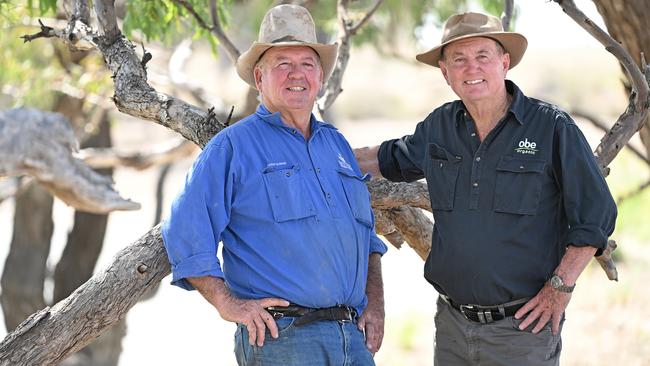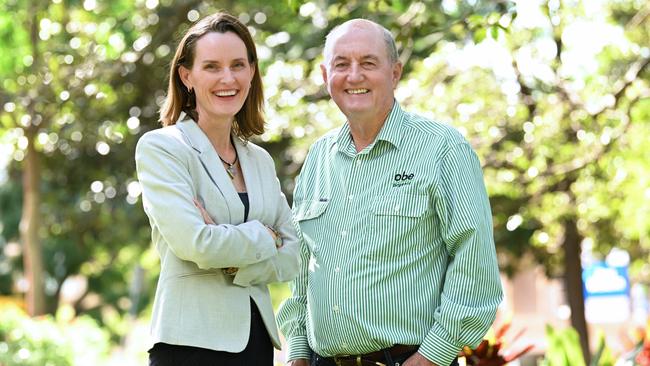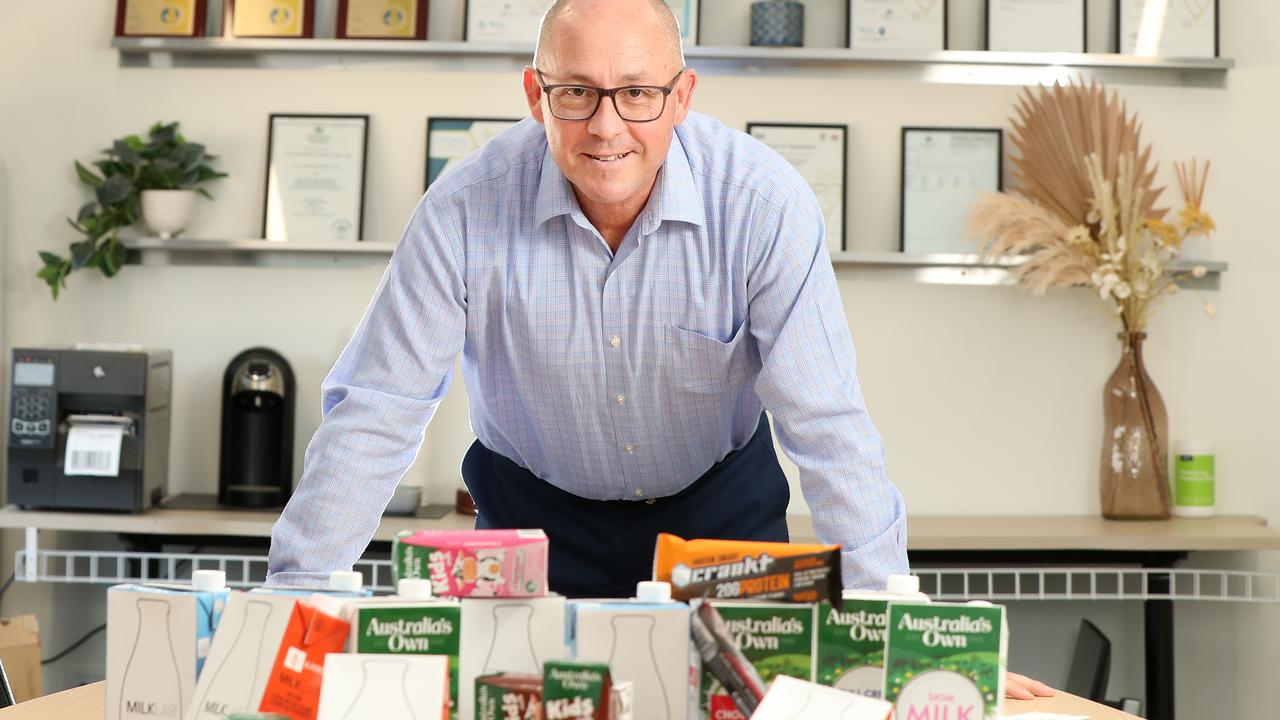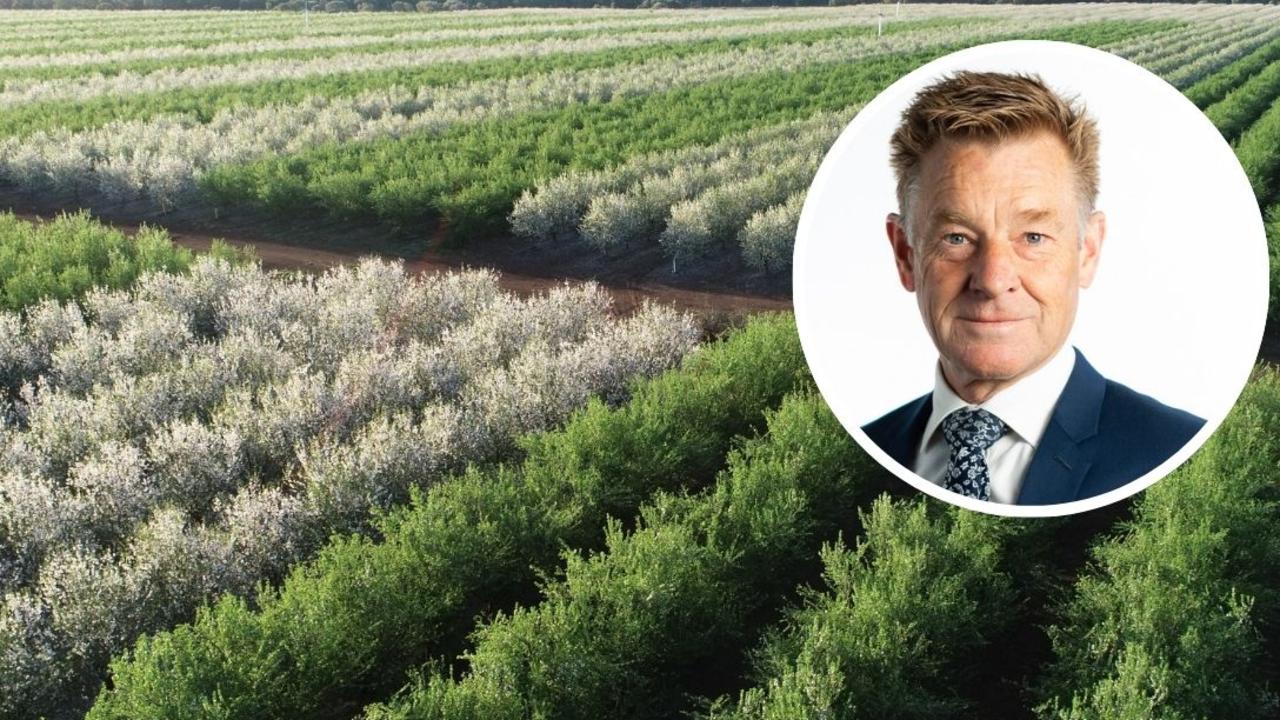OBE Organic, Crown Pastoral: The farmers responding to a growing organic market
Australia’s $2 billion organic food industry is growing rapidly in the wake of the pandemic, and farmers are responding in a big way.

The web of waterways of the Channel Country in far southwest Queensland are bulging and its red gibber stone plains are covered with lush grass.
It has been an extraordinary season too for the Hereford cattle run on Nell and David Brook’s property Adria Downs just outside Birdsville, one of the family’s five outback properties covering three million hectares in the Lake Eyre Basin which forms the cornerstone of their associated organic beef business, OBE Organic.
Started in the late 1990s, OBE Organic is one of the large-scale pioneering producers of Australia’s $2 billion-and-growing organic food industry.
A joint enterprise owned by the outback pastoral families that supply the business with 10,000 cattle a year, the eight million hectares of arid country (the size of Tasmania) where the OBE cattle herds roam and graze native grasses and bushes are all certified as organic land since no chemicals, fertilisers, antibiotics or hormones have ever been used in this remote country.

OBE Organic now exports its organic grass-fed beef to 14 countries – benefiting from a 10-30 per cent price premium for being organically produced – as well as supplies the domestic market.
“We like to say our cattle live on nature’s perfect farm, which results in some of the world’s most perfect beef,” says OBE Organic chairman and Birdsville pastoralist David Brook.
Organic beef from outback Australia is one of the big success stories of Australia’s thriving $2 billion organic industry.
Major cattle companies with vast inland stations accredited for organic production include Crown Point Pastoral, owned by Viv Oldfield and Donny Costello, now Australia’s largest landholders, and the Canadian pension fund-owned Hewitt Cattle Company.
Last year, about 40 per cent of all $2 billion certified organic food production in Australia was high-value organic beef, mostly from cattle raised in inland Australia and processed by companies such as OBE, Crown Pastoral, Nippon Beef, JBS, Arcadian and AMG. While exact data is hard to come by, about a quarter of Australia’s total organic exports (by tonnage) is accredited organic meat, 90 per cent of which is shipped or flown chilled and frozen to the US.

Other major overseas markets are high-value destinations such as Hong Kong, Japan, South Korea, United Arab Emirates, Europe and China.
“There’s huge potential still in export markets or we wouldn’t be doing what we do,” says Dalene Wray, managing director of OBE Organic, who monitors social media platforms and responses to OBE Organic postings extremely closely.
“In China, if you only have one child and want them to be healthy, safe and long lived, by preference you only want to buy Australian-grown food and it must be organic too.
“We are finding that consumers globally are asking for organic beef primarily on health and animal welfare grounds, long before they are interested in other things like carbon emissions or meat’s impact on climate change. The key considerations from importers are that the meat is 100 per cent certified organic by a third-party auditor to guarantee integrity, and that it meets their country’s importing standards.
“The issue now is market access for Australian certified organic produce as there are some technical trade barriers in countries like South Korea; the Australian government is making progress on market access for organics but a lot more can be done to fulfil the potential.”
The popularity of organically produced food – that is, food grown or animals raised without the on-farm use of hormones, chemicals, synthetic fertilisers, routine antibiotic use and herbicides such as glyphosate – remains undiminished worldwide.
Globally, organic food demand is estimated to be worth $187 billion and growing at a phenomenal rate of 12 per cent a year, snapping up produce generated by 75 million organic farmers and businesses.
In Australia, the industry is much smaller. It is estimated about 1500 accredited organic farmers nationally grow produce valued at about $2 billion a year, with a large portion – such as organic meat – exported.
Wray believes the slow but steady start to organic consumption domestically is because Australians are both lucky and spoiled; that here organic food is seen as a pleasant alternative to conventional supermarket food with possible health benefits to be bought when it can be afforded, rather than as necessity.

“I’m an ‘organic Mum’; I’ve got three children and I continuously look for organic food because it’s better for you, is chemical free and tastes better too,” Wray says.
“But most Australians are a bit naive to the pros of organic food because we are so lucky that most fresh food grown and produced in Australia is relatively clean and safe – we haven’t had the food scares of Asia and Europe. But how long will that continue for, especially as we are now importing more food from countries like China?”
However local organic demand is building. Last year’s survey by peak industry body Australian Organic Ltd found a remarkably similar growth rate to the global uptake of organic food, 12.8 per cent every year.
While there are fewer organic farmers than a decade ago, those that remain have become bigger scale producers. They have been joined by major agricultural companies developing organic brands and lines, and even buying accredited organic farmland, to meet the demand and earn the typical organic price premium of up to 20-30 per cent.
An unintentional boost to Australia’s organic status has been the ability of the vast outback cattle stations that have been run so lightly and extensively to earn organic certification. It has turned Australia into the nation with the most certified organic farmland in the world (23 million hectares), 30 per cent of all organic production farmland by area on earth.
Australian Organic chief executive Niki Ford says it is clear more consumers are seeking out organic produce for its health, animal welfare and environmental benefits.
“In the last decade, organic (food) has gone from being a niche industry to mainstream,” Ford says. “We’ve seen rationalisation in the number of farmers in the past 12 months, but that’s partly because many successful organic farmers are buying other certified organic farms, diversifying and vertically integrating their businesses.”
Ford says the big challenge now is to change the regulatory framework to boost consumer confidence. While any produce that is exported must be formally certified and audited according to national standards to prove and guarantee its organic credentials, the same strict rules do not apply in Australia. Due to the lack of domestic regulation, products with as little as 2 per cent organic ingredients are being sold with an organic claim on their label.
“We’re requesting federal legislation to be enacted that says a product can only be labelled organic in Australia if it has been certified as organic under the national standard; it would regulate the industry; give it increased credibility,” Ford says.
SCALING UP
The flooded Murray River is lapping at the 60 hectares of sand ridges at Barham NSW, where Wayne Shields expanded his Victorian organic vegetable business, Peninsula Fresh Organics, 10 years ago, but his optimism remains unbounded.
Shields is one of Victoria’s major organic farmers, who has seen the industry grow and change from its cottage stage to its new-found role as part of mainstream agriculture – and he has transformed his focus and scale with the shift.
Originally selling organic lettuces and other vegetables at local markets on the Mornington Peninsula from his home in Red Hill, in 2008 Shields and his wife, Tash, formed Peninsula Fresh Organics and started larger scale vegetable production on 30 hectares near Baxter, undertaking the required three-year conversion-to-certified-organic land process.

By 2013, to be able to guarantee year-round supply to their regular customers, local greengrocers and increasingly some bigger Melbourne outlets through the Melbourne wholesale markets, the couple bought their second and larger certified organic farm on the Murray, where its warmer climate and irrigation means green vegetables can be grown continuously.
Now Shields sells his organic lettuces, Asian greens, kale, broccolini, leeks, cauliflower and beetroot to wholesale markets in Melbourne, Sydney and Queensland, where they are bought by the major supermarkets. Some also retail in his own Peninsula Fresh Organics packaging.
His scale and production have soared over the past decade, as the trained horticulturist has honed how to grow quality vegetables organically, without using any insecticides, synthetic fertiliser or chemical weed control.
Instead compost blends using chicken and cow manure and carp fertiliser blended in a biological digester are used to improve the soil and nurture his crops, natural biological agents such as other predator insects, bacteria, decoy crops and companion plantings are used to control insect pests, and weeds are controlled manually and using cropping management rotations.
“It has been a learning curve but the more crops I grow and the longer I am an organic producer, the simpler it is,” says Shields, who used to manage large-scale conventional vegetable farms before starting his own organic business.
“It was never our plan to grow this big but we have grown with demand. It used to be a niche demand from contrarians but now young people and professionals are grasping hold of it because they value what they eat, and it fits in with climate change concerns and environmental awareness; people are starting to question all these things about food and farming and luckily organics is on the right side of the argument.”
Now Peninsula Fresh has a $5 million-plus annual turnover, sells more than 1.5 million Asian green heads, 2 million lettuces and half million leeks a year, and Shields has become a key figure in the push to better regulate the industry.
He sits on the board of the major certifying authority, Australian Certified Organic, which accredits farmers to use the highly recognisable organic “bud” logo on their produce, and is a big supporter of the need for national laws to mandate that all organic food sold in Australia must be formally certified as organic.
“The big change in the industry is the significant pull through from the big retailers; 10 to 20 years ago they found it difficult to engage with organic growers because of the lack of scale,” Shields says.
Madelaine Scott is another veteran of the organic world, who started selling organic eggs from her family’s Hollyburton Farm near Romsey at farmers’ markets when she was just 12.
Now a mother of three young children, her organic Madelaine’s Eggs business has grown with her over the past 20 years. She runs 4000 laying hens in 10 movable hen houses, supplying more than 18,000 eggs a week to cafes, restaurants, greengrocers and fresh food delis across Melbourne.

It’s a particularly hard road being a certified organic egg farmer as Scott has to also bred and rear her own baby chickens to ensure they only eat organic grain for their entire lives. Fortunately, the supply of organic feed and grain has become easier and more reliable in the past few years, as more grain growers have turned their hand to highly paid organic production.
“Ever since Covid I think there has been a greater demand for organic food,” says Scott, whose coveted eggs retail for $14-$16 a dozen. “Egg quality, because it’s organic, and ethics are my two big selling points, but they taste so much better too.”
But Scott still has concerns that consumer demand for organic food in Australia remains highly sensitive. In the past three months, since mortgage interest rates started steeply rising and recession fears grew, her egg sales have crashed by 30 per cent.
“People are feeling really financially strained and are thinking twice about their food bill; they are picking the cheapest option and going for price over quality,” she says.
ORGANIC NEWCOMERS BY NECESSITY
For South Gippsland dairy farmers Con and Deanna de Bondt, their switch to organic farming was almost forced on them by milk market disaster of 2016.
Without notice, their regular milk processor Murray Goulburn suddenly crashed the milk price it was prepared to pay its farmers and then tried to “clawback” payments already made for the previous eight months of supplied milk.
The de Bondts, who had been dairy farming conventionally for 32 years and were milking up to 500 cows on their fertile 600 hectares of farmland near Inverloch, could not afford to buy fertiliser and couldn’t see how they could make their finances add up any longer.

“We were talking to a neighbour and then we saw a milk truck go by with ‘organic milk’ on its side and he said to us: ‘why don’t you give that a try?’,” Deanna recalls.
“So we went cold turkey there and then and started the conversion-to-organic process. There were not a lot of organic dairy farmers around then and not much information on what remedies and techniques you could use to replace chemicals.
“It was hard work, it was an awful season to be trying it, and we didn’t know if it was viable or not – and then the season turned, we worked things out and we wouldn’t do it any other way now.”
The de Bondts now supply their highly-prized organic milk daily to Australian Consolidated Milk and have become one of Australia’s largest organic milk suppliers.
Con de Bondt says the key to doing organic dairy farming well and with integrity is to make sure any hay or feed that comes on to the farm is fully organic certified and then to be scrupulous about disease detection.
They spread their own cow manure back on to paddocks, now make all their own required silage and add small amounts of natural Buchan lime to the soil. The only input brought on to the farm now is lime, and the only things that leave it are organic milk and some excess yearling heifers for sale to China, in a new almost-closed loop organic system.
Large solar panels and a $600,000 battery storage system also make the de Bondts farm power supply for their dairy more sustainable and much less expensive.
“We are a large farm and it has been a big change, but I wouldn’t have it any other way; we certainly would never switch back from organic to conventional systems,” Con says.
“We’ve seen the soil biology improve, the cows are healthier and when your animals are healthy, they don’t get sick and they don’t need treatments.
“We may have lost a little milk volume, but we were never a high-input-high-output farm, and what we have lost is made up for by the higher price paid for certified organic milk; it’s usually a couple of dollars higher (per kilogram of milk solids), than we would have been getting and unlike conventional farmers we are guaranteed a $8/kg minimum price.”
Both Con and Deanna say the switch to organic has made their milk taste better, been great for their finances, and ensured their family business will be around for a long time.
They are even considering changing to milking their cows just once a day instead of twice, with the higher organic milk price, labour savings and better lifestyle balance more than making up for the likely 15 per cent reduced overall milk production.
“A lot of people used to think organics was fly-by-night,” Con says, “but it’s what consumers around the world – even more so than in Australia want – sustainable, organic, high quality, healthy food.”




